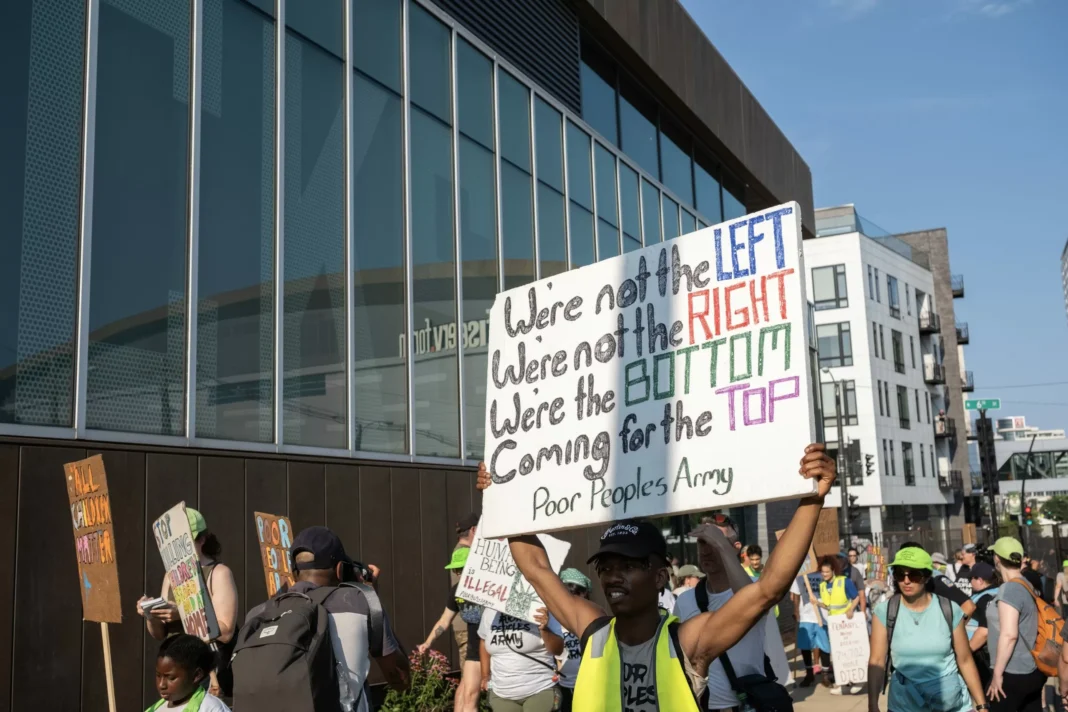In the midst of uncertain times and deepening inequalities, we are witnessing a powerful struggle emerge across the United States. This is a struggle for survival, for justice, for a fair and equitable society. And as we navigate through these turbulent waters, Rev. Dr. Liz Theoharis and Noam Sandweiss-Back urge us to consider a crucial question: How do we bring greater organization and coordination to this movement?
Rev. Dr. Theoharis, a leading figure in the fight against poverty and co-chair of the Poor People’s Campaign, along with Sandweiss-Back, a young activist and writer, have been on the frontlines of this struggle. They have seen first-hand the devastating effects of poverty, racism, and other forms of injustice on communities across the country. And they understand that the key to creating lasting and meaningful change lies in the strength and unity of the people.
The current state of our nation is one of deep division and growing inequality. The COVID-19 pandemic has exposed and exacerbated these issues, leaving millions of Americans struggling to survive. The poor and marginalized communities have been hit hardest, further highlighting the systemic injustices that have long existed in our society. But in the face of these challenges, people are rising up and fighting back.
The Black Lives Matter movement has gained momentum and sparked a national reckoning with systemic racism. The fight for immigrant rights continues to push for a more just and compassionate immigration system. The labor movement is demanding fair wages and better working conditions. And the Poor People’s Campaign, inspired by the legacy of Dr. Martin Luther King Jr., is calling for a moral revival and a redistribution of wealth and power.
But as Rev. Dr. Theoharis and Sandweiss-Back remind us, these struggles must be brought together and united in a common goal. We must recognize that all forms of oppression are interconnected and cannot be addressed separately. The fight for racial justice is inseparable from the fight against poverty and the fight for workers’ rights. And in order to win, we must stand together.
Bringing greater organization and coordination to this emergent struggle is no easy task. It requires building bridges and alliances between different movements and communities. It requires recognizing and amplifying the voices of those most affected by the issues at hand. And it requires a deep sense of solidarity, understanding that our liberation is intertwined.
We must also confront the forces that seek to divide us and maintain the status quo. As Rev. Dr. Theoharis points out, “Our opponents are organized and have been for a long time. They’ve got think tanks, they’ve got money, they’ve got politicians.” But with unity and determination, we can overcome these obstacles and build a more just and equitable society.
At the heart of this struggle is a vision of a better world, a world in which all individuals have the opportunity to thrive and reach their full potential. This vision is not a far-off dream, but a tangible and achievable reality. And as we come together and organize, we are inching closer to making it a reality.
We must also remember that our actions and choices today will have a profound impact on future generations. As Sandweiss-Back says, “We are not only fighting for ourselves, but for our children and grandchildren as well.” The future belongs to us, and it is up to us to shape it for the better.
Rev. Dr. Theoharis and Sandweiss-Back’s call for greater organization and coordination is not just a call to action, but a call to unity, solidarity, and hope. It is a call for all of us to come together and fight for a better world. So as we navigate through this critical moment in history, let us remember their words and work towards a future that is fair, just, and equitable for all.


